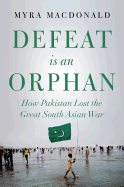
In Defeat Is an Orphan: How Pakistan Lost the Great South Asian War, Myra MacDonald quickly covers the milestones of the Indo-Pakistani conflict, fought on and off since 1947, without lingering on episodes that have already been written about at length. Instead, MacDonald focuses on the period from 1998--when India and Pakistan held nuclear tests--to the present day, putting an emphasis on the strategic missteps that allowed India to overtake Pakistan in the two countries' long, bitter rivalry.
Nuclear tests in 1998 were an ecstatic moment for Pakistan, promising strategic parity with its much larger neighbor for the first time. Emboldened by its newfound nuclear umbrella, however, Pakistan increased its sponsorship of militant, terrorist groups, a policy that would eventually alienate the international community and undermine the country's domestic security. Indian interests, on the other hand, lay in improving relations with the international community (including a much warmer relationship with the U.S.) and in expanding its economy. To some degree, MacDonald explains, the rivalry became one-sided: "India had no need to win a war against Pakistan--Pakistan was doing enough damage to itself to lose the competition with its bigger neighbour it had once hoped to win."
MacDonald's history is primarily a work of argumentation, but it is supported by vivid, terrifying accounts of attacks carried out by Pakistan's proxies. According to MacDonald, Pakistan's ideological blindness and short-sighted strategies led to it "fighting a war it did not itself understand" and helping to inflict the current scourge of terrorism on the wider world and on itself. --Hank Stephenson, bookseller, Flyleaf Books

